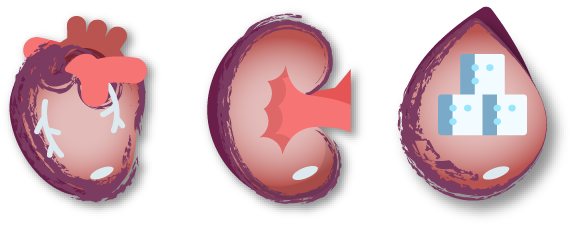IMPACT OF IRON DEFICIENCY ANEMIA IN
NON-DIALYSIS-DEPENDENT CHRONIC KIDNEY DISEASE
Anemia in CKD has been shown to be associated with an increased risk of morbidity and mortality due to the following:
- Coronary artery disease
- Congestive heart failure
- Diabetes mellitus
- End-stage kidney disease

Anemia accelerates the progression of heart disease and increases the risk of death.1 Anemia in CKD may be frequently associated with a reduced quality of life.1
Key Points: Anemia of CKD2

- Decreased EPO production
- Increased hepcidin due to decreased renal clearance and increased IL 6. Leads
to iron sequestration in macrophages and iron restricted erythropoiesis, erythropoietin resistance. - True iron deficiency due to increased blood loss and hepcidin-mediated decrease in intestinal iron absorption
- Suppression of erythropoiesis by inflammatory cytokines. Important in acute inflammation
- Shortened erythrocyte lifespan due to inflammation and uremia
Download this article as a PDF
REFERENCES:
- Gafter-Gvili A, Schechter A, Rozen-Zvi B. Iron Deciency Anemia in Chronic Kidney Disease. Acta Haematol. 2019;142(1):44-50. doi: 10.1159/000496492. Epub 2019.
- Batchelor EK, Kapitsinou P, Pergola PE, et al. Iron Deciency in Chronic Kidney Disease: Updates on Pathophysiology, Diagnosis, and Treatment. J Am Soc Nephrol. 2020;31(3):456-468. doi: 10.1681/ASN.2019020213. Epub 2020.

